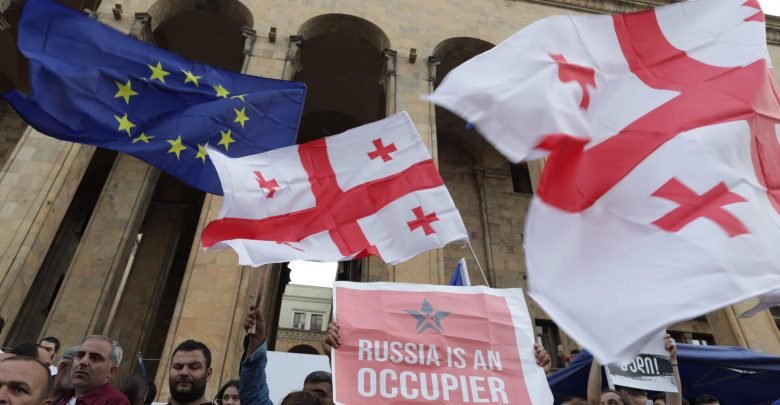
Georgian Politicians Comment on Tightening Immigration Rules for Russians
On September 21, Russian President Vladimir Putin announced what he termed a “limited” mobilization of Russia’s military reserves. Some Georgian commentators and politicians worry of the wave of Russian citizens trying to evade mobilization fleeing to Georgia.
Anecdotal reports emerged of the long queues at the Larsi road checkpoint at Georgia’s northern border. Even so, the Revenue Service, which oversees the customs, stated on September 22 that “no sharp fluctuation/increase” in the number of persons or goods crossing the checkpoint at Kazbegi (Larsi) was registered. The service says the work of this customs point is “unhindered”.
As several EU countries bordering Russia have tightened controls, or abolished disbursement of the tourist visas to Russian citizens altogether, Georgia remains one of the simplest alternatives to flee – a Russian citizen in possession of a so called “foreign passport” can spend up to a year Georgia. Consequently, the calls for tightening the visa regulations have grown louder.
- August 2022: Calls Increase for Visa Requirements for Russians
- March 2022: Interior Minister: Over 12,000 Russians Stayed in Georgia Since Ukraine War
- March 2022: Worries in Georgia amid Reports of Russian Influx
What should the government do and how should it avoid or manage potential risks? Civil.ge offers a compilation of remarks by the ruling party and opposition politicians:
The ruling party’s assessments
MP Irakli Kobakhidze, chairman of the “Georgian Dream”, said that the government does its utmost to ensure national security. Pointing to previous influx of Russians, when the war on Ukraine was launched past February, he said that “artificial campaigns” had been unleashed against the Russian tourists, but fears proved “absolutely groundless, fake and artificial”, serving political goals. “The situation is fully under control and the government assumes full responsibility for it,” Kobakhidze noted, adding that some threats do exist and “just that is why we were calling on political actors, including the radical opposition [the term GD uses to denote UNM], and the relevant NGOs, to refrain from war-mongering rhetoric and provocations, but they continue with the same rhetoric, and with provocative actions, which is unacceptable.” He added that now, as Russia announced mobilization, “we should stay vigilant and cautious” in assessment of the threats.
MP Nikoloz Samkharadze, Chairman of the Parliament’s Foreign Relations Committee, noted that there are a lot of ethnic Georgians among Russian citizens who returned to Georgia. “If the risks are as high as to require legislative amendments or restrictions, relevant agencies should issue such recommendation,” he noted.
Tea Akhvlediani, State Minister for Reconciliation and Civic Equality, noted that “this time, a threat is hypothetical in nature. We will discuss this issue if it becomes real.”
Opposition’s assessments
Kakhaber Kemoklidze, For Georgia party, former Secretary of the National Security Council, said that Putin’s decision suggests that Russia is facing a defeat in Ukraine. “This decision will prompt a lot of people to leave Russia and a wave of migration will grow further, increasing national security risks,” he noted, adding that given the potential scale of the influx “from a hostile state”, security services won’t be able to “control for risks on the operative level” even if there was the political will to do so. He expressed concern that “the ruling party does not want to see the threat” and called for tightening the rules for the entry and registration of Russian citizens in Georgia. “Customs officers should know what the purpose of their arrival is, where they will live and they should provide this information to the State Security Service,” creating an updated database to track the potential risks. He said while the decision to introduce or tighten the visa regime is a political one, measures could be taken short of that, to tighten immigration control and increase the amount of information the state gets about the new entrants. Kemoklidze said, this can be done given the political will, but added, “in my opinion, neither the State Security Service, nor Georgian Dream have such will”.
Salome Samadashvili, Lelo for Georgia party said that Russia’s military call-up will lead to increased numbers of Russian citizens leaving their country. “Georgia remains the easiest place for Russian citizens to enter without visas. Considering our security challenges, we have been warning the government since the very beginning of Russia’s invasion of Ukraine that it is necessary to focus on imposing visa requirements for Russian citizens,” she stressed. But since the government took no steps, “we offer to launch discussions in the Parliament on adopting relevant legislative amendments and introducing strict short-term visa requirements for Russian citizens,” Samadashvili added.
Paata Manjgaladze, “Strategy Agmashenebeli” claimed more than 300,000 Russian citizens have entered Georgia. [this figure is challenged: in March, the Minister of Interior said over 12,000 Russians stayed in Georgia since the start of Russia’s full-scale invasion of Ukraine – Civil.ge]. “Now a new wave has emerged – those people who do not want to go to war have rushed to the borders of various countries, but most European countries are closed for them. Naturally, we cannot turn Georgia into the place of concentration of deserters,” he stressed and called for taking necessary security measures. “We should let in only those people who are against Putin’s regime. Georgia’s security should not be jeopardized, because nobody knows who will come in together with the so called “deserters,” Manjgaladze added.
Giga Bokeria, chairman of European Georgia party, noted that the inflow of Russian citizens further expands Russia’s capabilities to have a deeper intelligence network for the future and “it represents a huge problem.” He stressed the need to “focus on changing the Putinist regime [in Georgia], because this is the precondition for pursuing an effective policy.”
More comments to follow as they emerge…
This post is also available in: ქართული Русский